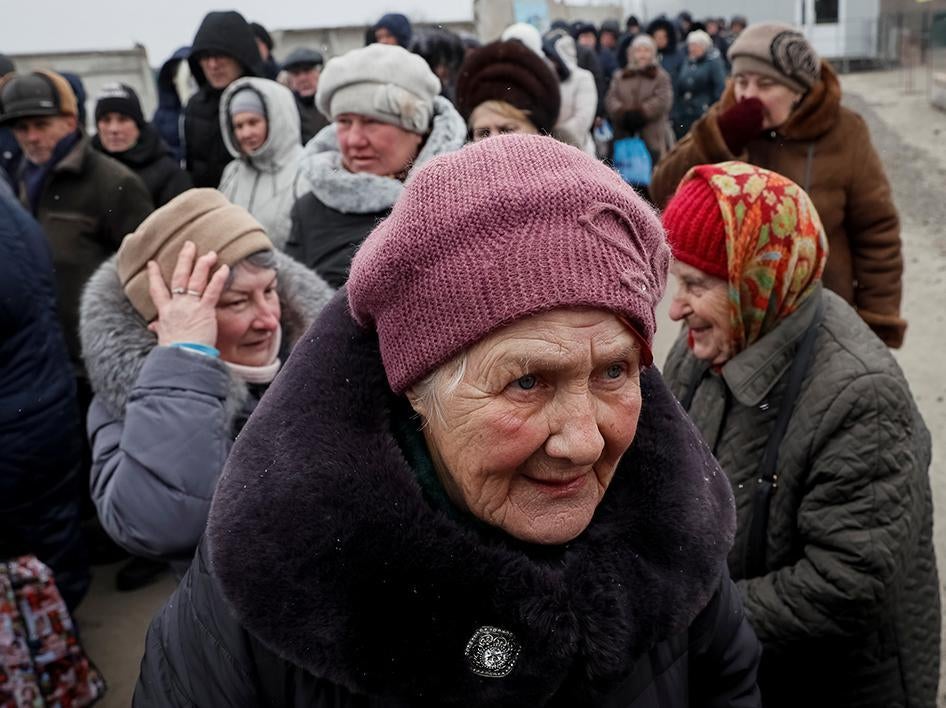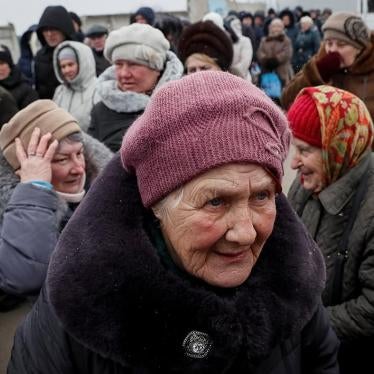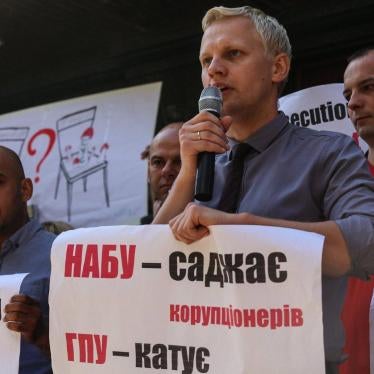On March 31, Ukrainians will go to the polls to vote in the country’s second presidential elections since fighting began five years ago between Ukrainian forces and Russian-backed armed groups. President Petro Poroshenko will face off against a record 43 other candidates for the post. Candidates have largely focused on the conflict in eastern Ukraine, corruption, and the pocketbook concerns of Ukrainians, which research shows top the list of issues voters care about most.
While human rights issues have not featured prominently in the campaign, whoever wins will inherit a number of challenges, from protecting the rights of lesbian, gay, bisexual and transgender (LGBT) people and Roma communities to safeguarding those living near the front lines in eastern Ukraine.
Who are the front-runners and what issues have they campaigned on?
Recent polls suggest that Volodymyr Zelenskiy, a comedian best known for playing a fictional Ukrainian president on television, leads the pack. In his campaign, Zelenskiy has promised to eradicate corruption, enhance direct democracy, and spend more on health care and education. Zelenskiy, who is from the country’s predominantly Russian-speaking southeast, has expressed frustration over talks to resolve the conflict in eastern Ukraine, and believes that Kyiv should engage directly with Moscow.
Poroshenko is vying for second place in the polls with former Prime Minister Yulia Tymoshenko. Poroshenko’s campaign catchphrase “Army! Language! Faith!” underscores his record as commander-in-chief during the war in the country's east, his controversial efforts to bolster the use of the Ukrainian language rather than Russian in state school classrooms and elsewhere, and his successful initiative to make the Ukrainian Orthodox Church independent from Moscow.
Tymoshenko, on the other hand, is focused on economic growth and bread-and-butter issues, such as lower gas prices. Former energy minister, Yuri Boyko, is in fourth place and former defense minister, Anatoliy Hrytsenko, is in fifth.
What are key human rights problems in Ukraine as the country goes to the polls?
Activists, members of minority groups, and journalists are frequent victims of attacks in Ukraine. Both the United Nations (UN) Office of the High Commissioner for Human Rights (OHCHR) and Human Rights Watch have documented an uptick in attacks by far-right radical groups, for which the attackers are rarely held accountable.
Efforts to curb freedom of expression increased in 2018, according to OHCHR. Violations of the freedom of the press continued in Ukraine: the Institute of Mass Information, a nongovernmental organization (NGO) in Ukraine, registered 235 such violations, including threats, intimidation, and physical assaults, in 2018. In March, journalists from Radio Free Europe/Radio Liberty's Ukrainian Service were assaulted by officials while conducting interviews.
Also in March, Ukraine denied entry to an Austrian journalist who had been critical of the Ukrainian government. In October, Ukraine's parliament adopted sanctions, including asset freezes and license suspensions, on companies affiliated with two major broadcasters, claiming that the channels’ pro-Russian tilt undermined Ukrainian sovereignty.
A March 2017 law requires activists and journalists investigating corruption to publicly declare their assets, and Ukrainian courts have granted prosecutors access to a reporter’s cellphone data and to the internal documents of a magazine investigating corruption allegations.
Activists in Ukraine have faced violence. An environmental activist who waged a campaign against pollution of a local river was found hanged, an anti-corruption activist was shot and required intensive care in Odessa, and in November the anti-corruption activist Kateryna Handzyuk died from wounds sustained in an acid attack. Minority groups in Ukraine regularly come under threat from far-right activists. Last year, women’s rights protesters were violently attacked in Kyiv and other cities, LGBT rights demonstrations in smaller Ukrainian cities lacked sufficient police protection, and ultranationalists attacked Roma settlements, killing at least one person and injuring several.
International rights organizations have said that Ukraine should thoroughly investigate these crimes and prosecute those responsible, but the government has not carried out effective investigations or prosecutions.
In addition, far-right nationalist groups continue to make their presence felt in Ukraine. Several such groups, some of which openly took part in attacks on minority communities, have been officially registered as election monitors.
What about the conflict in eastern Ukraine?
Since 2014, Russia has occupied the Crimean Peninsula and backed armed groups controlling large parts of Ukraine’s Donetsk and Luhansk regions. The UN estimates that over 3,300 civilians have been killed in the fighting, and while casualties have dropped substantially, Ukrainians living near the front line continue to face threats to their lives, health, and economic wellbeing as a result of the conflict.
Human Rights Watch and Ukrainian groups have documented the difficulties older people and those with disabilities face when crossing the front line, called the line of contact, which divides Ukrainian forces and Russia-backed armed groups. Crossing points have limited sanitary and medical facilities, few wheelchairs, and no shelter from extreme heat or cold, compounding the fact that those crossing routinely face long waits.
About half of the one million people who cross every month are older people, many of whom need to travel to collect their pensions. Ukraine requires pensioners from occupied parts of eastern Ukraine to register as internally displaced persons at addresses in government-held territory, a discriminatory rule that causes unnecessary hardship and can lead to the arbitrary deprivation of pension rights. Despite a recent Supreme Court decision barring the government from conducting random house visits to strike people from the pension rolls if they are not found at their registered address, rights groups say the practice continues unabated.
Many Ukrainians who have been displaced by the conflict in Donetsk and Luhansk may face difficulties voting in the upcoming elections. While the country’s 1.3 million displaced people have the right to vote in presidential and parliamentary elections, exercising that right requires special procedures and research indicates that many people are unaware of them.
Almost half of all displaced people surveyed by the International Migration Organization said they did not know whether they would vote or they had no plans to, of the latter, 37 percent believed they did not have the right to, and 12 percent said they did not know how. According to NGOs following the issue as of early March, only four percent of displaced people had registered to vote, compared with a predicted turnout of around 68 percent in the country as a whole.
Have any of the candidates mentioned human rights in their campaign manifestos?
Human rights have not been a major part of leading candidates’ platforms. Most candidates have pledged to fight corruption, but other than tributes to and calls for justice on behalf of Kateryna Handzyuk, the anti-corruption campaigner who was the victim of the most high-profile attack on an activist in recent years, only a few have promised to safeguard activists in systemic ways. The rights of LGBT people, women, and Roma people, and the problem of hate-motivated violence, have largely gone without mention.
Some candidates have been vocal on the rights of displaced people: Tymoshenko pledged to rebuild damaged property in eastern Ukraine and guarantee housing and work for displaced people, while Hrytsenko’s platform promised them easier access to credit and jobs. Politicians from southeastern Ukraine such as Boyko and Serhiy Taruta, the former governor of Donetsk, have promised compensation for those who lost property during the war, and less restrictive access to pensions and other benefits for those living in occupied territory.









